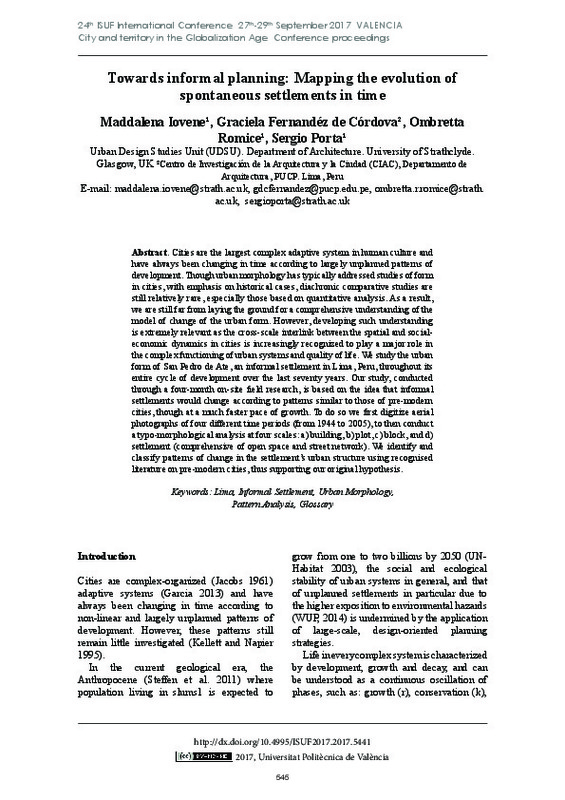JavaScript is disabled for your browser. Some features of this site may not work without it.
Buscar en RiuNet
Listar
Mi cuenta
Estadísticas
Ayuda RiuNet
Admin. UPV
Towards Informal Planning: Mapping the Evolution of Spontaneous Settlements in Time
Mostrar el registro sencillo del ítem
Ficheros en el ítem
| dc.contributor.author | Iovene, Maddalena
|
es_ES |
| dc.contributor.author | Fernández de Córdova, Graciela
|
es_ES |
| dc.contributor.author | Romice, Ombretta
|
es_ES |
| dc.contributor.author | Porta, Sergio
|
es_ES |
| dc.date.accessioned | 2018-12-18T08:41:35Z | |
| dc.date.available | 2018-12-18T08:41:35Z | |
| dc.date.issued | 2018-04-20 | |
| dc.identifier.isbn | 9788490485743 | |
| dc.identifier.uri | http://hdl.handle.net/10251/114049 | |
| dc.description.abstract | [EN] Cities are the largest complex adaptive system in human culture and have always been changing in time according to largely unplanned patterns of development. Though urban morphology has typically addressed studies of form in cities, with emphasis on historical cases, diachronic comparative studies are still relatively rare, especially those based on quantitative analysis. As a result, we are still far from laying the ground for a comprehensive understanding of the urban form’s model of change. However, developing such understanding is extremely relevant as the cross-scale interlink between the spatial and social-economic dynamics in cities are increasingly recognized to play a major role in the complex functioning of urban systems and quality of life. We study the urban form of San Pedro de Ate, an informal settlement in Lima, Peru, along its entire cycle of development over the last seventy years. Our study, conducted through a four-months on-site field research, is based on the idea that informal settlements would change according to patterns similar to those of pre-modern cities, though at a much faster pace of growth, yet giving the opportunity to observe the evolution of an urban organism in a limited time span. To do so we first digitalize aerial photographs of five different time periods (from 1944 to 2013), to then conduct a typo-morphological analysis at five scales: a) unit, b) building, c) plot, d) block, and e) settlement (comprehensive of public spaces and street network). We identify and classify patterns of change in the settlement’s urban structure using recognised literature on pre-modern cities, thus supporting our original hypothesis. | es_ES |
| dc.format.extent | 13 | es_ES |
| dc.language | Inglés | es_ES |
| dc.publisher | Editorial Universitat Politècnica de València | es_ES |
| dc.relation.ispartof | 24th ISUF International Conference. Book of Papers | es_ES |
| dc.rights | Reconocimiento - No comercial - Sin obra derivada (by-nc-nd) | es_ES |
| dc.subject | Lima | es_ES |
| dc.subject | Informal settlement | es_ES |
| dc.subject | Urban morphology | es_ES |
| dc.subject | Pattern analysis | es_ES |
| dc.subject | Glossary | es_ES |
| dc.title | Towards Informal Planning: Mapping the Evolution of Spontaneous Settlements in Time | es_ES |
| dc.type | Capítulo de libro | es_ES |
| dc.type | Comunicación en congreso | es_ES |
| dc.identifier.doi | 10.4995/ISUF2017.2017.5441 | |
| dc.rights.accessRights | Abierto | es_ES |
| dc.description.bibliographicCitation | Iovene, M.; Fernández De Córdova, G.; Romice, O.; Porta, S. (2018). Towards Informal Planning: Mapping the Evolution of Spontaneous Settlements in Time. En 24th ISUF International Conference. Book of Papers. Editorial Universitat Politècnica de València. 545-557. https://doi.org/10.4995/ISUF2017.2017.5441 | es_ES |
| dc.description.accrualMethod | OCS | es_ES |
| dc.relation.conferencename | 24th ISUF 2017 - City and Territory in the Globalization Age | es_ES |
| dc.relation.conferencedate | Septiembre 27-29,2017 | es_ES |
| dc.relation.conferenceplace | Valencia, Spain | es_ES |
| dc.relation.publisherversion | http://ocs.editorial.upv.es/index.php/ISUF/ISUF2017/paper/view/5441 | es_ES |
| dc.description.upvformatpinicio | 545 | es_ES |
| dc.description.upvformatpfin | 557 | es_ES |
| dc.type.version | info:eu-repo/semantics/publishedVersion | es_ES |
| dc.relation.pasarela | OCS\5441 | es_ES |








